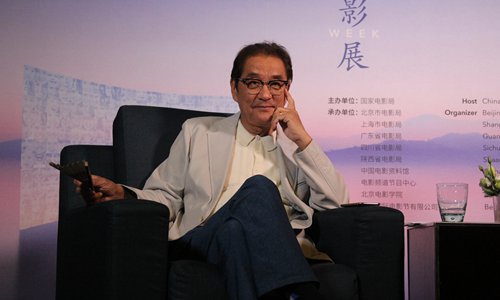HOME >> ARTS
Interview with Oscar-winning Japanese director Yojiro Takita
By Wang Qi Source:Global Times Published: 2019/5/30 17:38:40

Oscar-winning Japanese director Yojiro Takita Photo: Tao Mingyang/GT
It was probably only after he won an Academy Award in 2008 with his masterpiece Departures that Chinese moviegoers took note of Japanese director Yojiro Takita. However, the director already had made a considerable name for himself before his Oscar win.Sitting down with the director on May 17 at Asia Film Week, I was impressed with his quiet reserve and energy. Just like the Japanese folding fan in his hand, which he constantly folded and unfolded, the director has experienced some major ups and downs in his career.
The director has a close relationship with China and Chinese culture. He has previously noted that he is a big fan of Yellow Earth by Chinese film director Chen Kaige. He also participated the 13th Shanghai International Film Festival (SIFF) as a jury member in 2010 and the Beijing International Film Festival (BJIFF) in 2016, which he referred to as a "precious experience."
Early experiences
The first turning point in Takita's life came in 1976, a time when he still numbered among the many confused and lost young people who were looking for a decent job in Tokyo. Instead of landing a job at an office, Takita discovered an interest in and talent for filmmaking.
"When I was young, I didn't know what job I would like to do actually. At the time, there were many cinemas in Japan that ran overnight and the film industry in Japan was prosperous. I also watched a lot of films at the time," he noted.
Takita started his career in a low position working on what are known as pink films in Japan - films with nudity or sexual content. This is a background that Takita shares with many other Japanese filmmakers such as Kiyoshi Kurosawa and Masayuki Suo, as pink films were a huge part of the Japanese film industry and were an easier entry point for aspiring filmmakers.
The director said that, in retrospect, he is very grateful for this experience. He talked about this time with laughter and said that while those types of films are relatively small-budget and cannot be played in public, they "allowed me to create freely."
After the first Tokyo International Film Festival (TIFF) kicked off in 1985, it changed the destiny of Japanese films and filmmakers. Through it many directors like Takeshi Kitano and Shunji Iwai were able to shine on the world stage.
After a decade accumulating film experience, Takita's life changing opportunity finally arrived during that time period as well.
In 1986, he shot his first regular film Comic Magazine. According to the director, fortune struck when a US director saw this film at a far-from-packed screening and recognized his talent. The director suggested that Takita exhibit the film at The Museum of Modern Art (MOMA) in New York.
"Then I received quite a lot applause and further received a ticket to Cannes, where I met Chinese director Chen Kaige, whose Yellow Earth shocked me a lot... The film opened the door to the world for me."
Round two
The time between Comic Magazine in 1986 and 2008's Departures can be regarded as round two of his filmmaking experience since it was during this time that he continued to polish his skills by trying to make films with very diverse styles.
During these two decades or so, Takita earned a number of international awards. In 2002, his film Onmyoji won a prize at the Neuchâtel International Fantastic Film Festival and soon became a hit in the global market. Based on a historical event, his When the Last Sword Is Drawn won the Best Film Award at the 2004 Japanese Academy Awards.
Interestingly, after his Oscar victory in 2008, he faced more criticism and doubts from the public and media. Many people complained that he was not as energetic and efficient as before since he made only four films after 2008, which is far less than the one film a year pace he kept during the first half of his film career (1986-2008).
Takita noted that he is still passionate and driven despite these controversies. He noted also that it might be because "people are becoming more demanding of me."
"Winning an Oscar was a godsend. After I won the award, I kept inspiring myself to be more modest and strive to make better films," Takita said.
"Numbers have declined, however, I still have accumulated a lot of energy and a lot of stories, which will be put on the screen in the future. I am still learning," he noted.
Newspaper headline: Freedom to create
Posted in: FILM,CULTURE & LEISURE